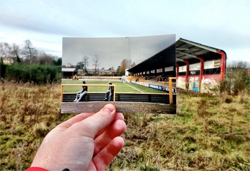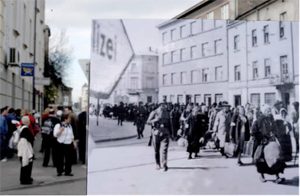
With the advances in technology hitting our classrooms on such a regular basis, we sometimes forget that the old ways are sometimes the best ways. You can have all the technology in the world, but sometimes being creative with what you've got can be a lot more powerful.
I stumbled across a fantastically creative, but amazingly simple, website a few months ago called Dear Photograph. Although the website is not intended to be an educational tool, with a bit of creative thinking, you'll find that the idea can be used to promote learning across a range of subjects.

One of the remarkable things about laughter is that it occurs unconsciously. You don’t decide to do it. While we can consciously inhibit it, we don’t consciously produce laughter. That’s why it’s very hard to laugh on command or to fake laughter.
Local history is a bit like this in that students acquire local historical knowledge unconsciously, but we find that use of this knowledge is inhibited by its unconscious acquisition; it is not ‘learned’, thus, it seems, students regard it to be of much lesser value than knowledge acquired more formally. On the other hand, I have found many students to be insular, most would find it difficult to place people and events in their correct historical context, as they did not have sufficient knowledge of the world beyond their local area. With a keen interest myself in local history, I found this enabled me to build strong relationships with students, as I was taking an interest in them and the places they were familiar with.
This article aims, therefore, to overcome students' usual inhibitions, and help them to use their local knowledge to drive forward their historical understanding, to expand their knowledge and horizons.

Politicians often remind us that we live in a modern world. A modern world, they say, requires a modern approach.
The first statement - that we live in a modern world - is so obvious that one is tempted to accept the second as equally self-evident, when in fact it is not.
The fact that a thing or idea is new or recent (which is all "modern" means) does not necessarily make it better than something older.
Of course, those in power want us to think that it does, because they want to bring in their own new ideas, or have recently done so. For them, admitting the superiority of an older way of doing things would mean conceding that there is no need for their new ideas (and no need for us to pay for them) or that the ideas they recently introduced have failed.
So they don't admit it. Instead they try to trick us into thinking that newer is always better: they use words such as modern and progressive as if they were synonymous with good; they scorn opponents for wanting to "turn back the clock", as if doing so would be unquestionably bad.

A community-driven platform for showcasing the latest innovations and voices in schools
Pioneer House
North Road
Ellesmere Port
CH65 1AD
United Kingdom